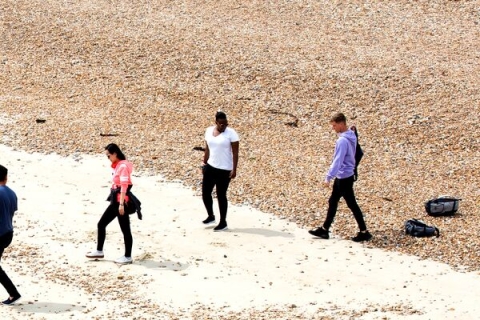

19 July 2018
4 min read
School groups, community organisations and beach lovers everywhere can combine seaside visits with a spot of scientific research by taking part in a new microplastic citizen science project
A University of Portsmouth researcher is calling upon everyone from science students and environmental groups to holidaymakers to do their bit for the planet by collecting tiny pieces of plastic to provide data for environmental scientists.
The Big Microplastic Survey is the brainchild of Portsmouth student David Jones, who is also the Founder of Just One Ocean, an environmental campaigning organisation. The collaboration between Just One Ocean and the University will gather the data collected by school parties, community organisations and other beach visitors and make it available for researchers to use in a wide range of studies.
Microplastics are having a devastating impact on the environment. They are being ingested by fish and birds and getting into the food chain. They are also having an impact on human health and we need to know more.
David Jones, MSc student and Just One Ocean founder
Plastic pollution is a significant threat to marine ecosystems and human health. Microplastics –extremely small pieces of plastic debris in the environment resulting from the disposal and breakdown of consumer products and industrial waste – are a particular concern.
David said: “One of the biggest global issues affecting our oceans is microplastics and while much of the focus of attention at the moment is on cleaning the bigger pieces of plastics from our beaches, there are significant gaps in our knowledge about the types of microplastic in our oceans and on our coastlines, as well as its concentration and its distribution.
Collecting data in a scientific way can be surprisingly simple. The Big Microplastic Survey makes the process as easy as possible for participants. Most of the items needed to undertake this scientific microplastic survey can be found around the house, or are available at a minimal cost.
David Jones, MSc student and Just One Ocean founder
“We know that microplastics are having a devastating impact on the environment. They are being ingested by fish and birds and getting into the food chain. They are also having an impact on human health and we need to know more. This project is all about getting people involved and gathering lots of data.”
Taking part in the Big Microplastic Survey isn’t simply a case of picking up pieces of plastic. However, collecting data in a scientific way can be surprisingly simple. The Big Microplastic Survey makes the process as easy as possible for participants. Most of the items needed to undertake this scientific microplastic survey can be found around the house, or are available at a minimal cost.
For academic research, data is key; we need reliable information about how much plastic is making its way onto our beaches and into our rivers and lakes, as well as what it is.
David Jones, MSc student and Just One Ocean founder
The University will be involved in the analysis of data as well as the preparation of scientific papers arising from the results alongside Just One Ocean. The data will also provide an opportunity to develop a range of other research projects at undergraduate and postgraduate level, all of which will continue to increase the knowledge base that already exists regarding microplastics. It is hoped that other universities and research organisations will be a part of the project in the future.
To register for a resource pack and find out what's involved visit the microplastics survey website.
How to collect samples
David Jones, Just One Ocean founder explains the basic process of collecting samples. Visit microplasticsurvey.org for more information on the survey
